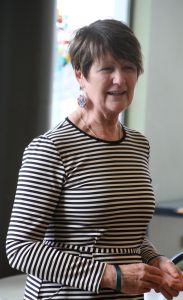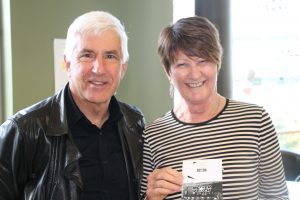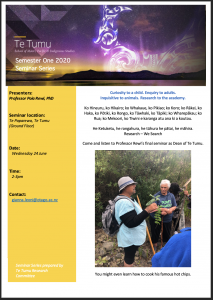He poroporoaki ki a Dr Lyn Carter
Te Tumu is seeing further staff changes with the retirement of another senior staff member, Dr Lyn Carter who, most recently, has been the Programme Coordinator of our Indigenous Development programme. Lyn was farewelled today at Te Tumu, accompanied by friends and colleagues from Te Tumu and the wider university, and by members of Kāti Huirapa ki Puketeraki.
Lyn was born in Christchurch but lived a large part of her life in the North Island, first in Hastings then in Auckland. Her dad’s parents emigrated from England after the First World War, and on her mother’s side she has links to early Scottish settlers – her great-grandparents had a boat building business at the bottom of Wharf Street in Dunedin. Her Kāi Tahu connections (Kāti Huirapa, Kāti Hawea, Kāti Ruahikihiki, with connections to Te Whānau a Apanui through the Stirling whānau) also come through her mother and grandmother through the Wybrow whānau.
After taking a few extra-mural papers at Massey as a young mum, Lyn enrolled a few years later at the University of Auckland as a mature student (known as “adult learners” at the time), and completed a BA, MA and PhD, all in both Social Anthropology and Māori Studies. She had some stellar names as supervisors for her postgrad study, such as Patu Hōhepa and Ngāpare Hopa, Sir Hugh Kāwharu and Andrew Sharpe. Lyn’s MA investigated “how oral traditions verify place on the landscape – this meant looking at the whakapapa relationships that make us who we are”. Her PhD, completed in 2003, was “Whakapapa and the State: Some Case Studies in the Impact of Central Government on Traditionally Organised Māori Groups”. Lyn says that she “steered slightly away from [her MA topic] with my PhD research mainly because of the circumstances surround Kai Tahu at the time. The treaty settlement negotiations and the eventual settlement made me think quite a lot about how being registered with an iwi could skew whakapapa from being the underlying force of identity and connections, relationships and so on, to becoming a name on a registration list. So I looked at how treaty settlement structures impacted on tradition-based whakapapa.” The thesis caused some debate within Ngāi Tahu circles.
Lyn undertook a variety of roles at the University of Auckland. She tutored for Jane McRae’s oral traditions papers, and through Jane and Jenny Curnow she became part of a team, in a Marsden-funded project, to develop English-language abstracts for articles in the Niupepa Māori corpus. These abstracts allow researchers who do not read Māori a window into the many Maori language newspapers from the nineteenth and early twentieth century. Lyn was also offered the lectureship teaching Ranginui Walker’s old paper, Maori Society, and developing further papers in contemporary Maori Society and Governance. During this time Lyn also fitted in a year teaching in the history programme at the University of Canterbury.
Lyn went on to become the Director of the School of Māori Development and Humanities, Waiariki Institute of Technology in Rotorua. Later, she moved to Te Whare Wānanga o Awanuiārangi in Whakatāne as Interim Director to develop and implement the Centre for Post Treaty Settlement Futures, working alongside Professor Tā Hirini Moko Mead and Tā Wira Gardiner. This work developed from her PhD research around settlement structures and governance challenges. While at Awanuiārangi, Lyn also held a position as Professor of Anthropology in the Post Graduate School, which involved both teaching and research.
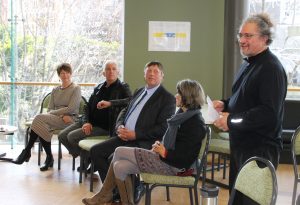
Poia Rewi (R) farewelling Lyn on behalf of Te Tumu. From left, Lyn and John, Matapura Ellison, and Katharina Ruckstuhl.
In 2011 Lyn joined us in Te Tumu. She says “I have worked with some really good and dedicated people here”. She is an active staff member, whose teaching and leadership has mainly been within our Indigenous Development programme. She has also formed excellent links with colleagues from other academic units, such as Geography and the Centre for Sustainability.
Coming to Otago allowed Lyn to engage more fully with her local Kāi Tahu connections. While she was in Auckland she helped found (with Hirini Matunga and Kepa Morgan) the taura here group, Kai Tahu ki Tamaki Makaurau. She already owned a crib at Warrington, so also used to attend various things at Puketeraki Marae at Karitāne so when she eventually moved down here to the University of Otago she was already involved to some extent with the marae – that spread to being on various committees and becoming very much part of the day-to-day life. She says “When I had my stroke I lived in our kaumatua house next door to the Runaka offices and that was amazing – such great support and whanaukataka from just living that close. I used to say that living away one could still participate, and yes you can, but I now realise that it is not the same as being in the landscape and rejoining with the whenua.”
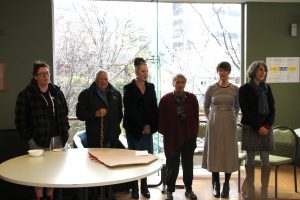
Megan Pōtiki, Hinerangi Ferrall-Heath, Janine Kapa, Khyla Russell, Lyn Carter, and Katharina Ruckstuhl.
Lyn was able to capitalise on her connections to Puketeraki in her popular paper, INDV301: Māori and Indigenous Development, Ethics and Governance, which not only provided students with theoretical tools, but took them outside the classroom for practical work with iwi and community groups on local projects.
Lyn’s research has followed a circular path with her current research interests drawing on her earlier research on how oral traditions verify place on the landscape. “I have now gone full circle and concentrate on place naming and landscape and identity – this led to me working with Sami researchers in arctic Norway where awareness of landscape and place naming shapes their existence. My research focus for the past 14 years has been on landscape and identity and in particular how place names can act as environmental indicators for landscape changes over time – more recently in the context of climate change. Again this is a key area working with Associate Professor Kaisa Helander in Gouvdageaidnu, the Sami capital in northern Norway.”
Lyn has many highlights from her academic career to look back on. “There are so many really – teaching has always been rewarding and seeing post-grad and graduate students develop and flourish has been great – brings truth to the whakatauki about new nets taking over from the old in terms of legacy for future Maori academics at universities. Each generation is the legacy of another. I have always felt privileged to have worked with people like Patu Hohepa, Bruce Biggs, Margaret Mutu, Ranginui Walker, Wairete Norman, Hugh Kawharu, up at Auckland – The ones who were instrumental in developing Maori Studies at a University and also getting the marae in place there.
“Te Wananga o Waipapa Marae never seemed like a University Department – more of a meeting of Maori minds. I remember we all took part in the Foreshore and Seabed march across the Harbour Bridge and hosted and supported the various hui and protest groups at Waipapa Marae – in some ways the Department operated as a marae, and the various protests were Maori society in action – Never sure though if many of the students appreciated it all LOL. But those were different times.
“What I have particularly liked at Otago is the whakawhanaukataka between Maori academics and staff on campus and how that brings Maori together from all disciplines – Maori first and that underpins academia.
“Perhaps the main highlights then are all the people I have met and worked with in some capacity and the broadening of mind and thought that that brings with it; not to mention the conferences and research projects that have stretched my own knowledge and capabilities for the better – I have discovered that yes, we are always learning.”
In 2018, Lyn published Indigenous Pacific Approaches to Climate Change: Aotearoa/New Zealand, published as part of Palgrave’s Studies in Disaster Anthropology Series. Click here to access the e-book. This was a sister volume to former Te Tumu academic, Jenny Bryant-Tokalau’s Indigenous Pacific Approaches to Climate Change: Pacific Island Countries.
Lyn says, “Publishing my book on climate change was an achievement – after my stroke I had three key goals and finishing that book was one of them. The others were seeing more of my mokos, and getting back on my motorbike.”
Indeed motorbike trips feature heavily in Lyn and her partner John’s retirement plans. This includes “extended touring around Te Waipoumanu and Aotearoa and visits with the mokos”, although she “may be delayed from going to London for a bit yet to see my son and whānau“. Lyn still has some work for Kāti Huirapa that she is continuing on with, but she says “I pretty much hope to do ABSOLUTELY NOTHING for a little while”.
He mihi nunui ki a koe, e hine; kāore e kore ka haere tonu āu mahi. Heoi, ko tō te Tumu tūmanako, ka harikoa, ka pārekareka hoki ngā tau maha o tō rītaiatanga.
Poia’s last seminar as Dean of Te Tumu
Professor Poia Rewi will be giving his last ever seminar to Te Tumu as Dean of our School. Poia has been an inspiring leader of Te Tumu and, as most of you know, we are very sad that he will soon be leaving the university for greener pastures elsewhere.
It would be wonderful if you are able to come along to the seminar; if not, then his talk will also be live-streamed on Te Tumu’s Facebook page.
Poia Rewi (Ngāti Manawa, Tūhoe, Te Arawa, Ngāti Whare and Tūwharetoa) hails from Murupara in the Bay of Plenty. He migrated south from Waikato University to Te Tumu, the University of Otago’s School of Māori, Pacific and Indigenous Studies in 2003 to help boost our Māori-language teaching programme. He is an acknowledged master of te reo Māori, always teaching the advanced-level language classes. A noted composer in his own right, he also taught Te Tumu’s advanced kapa haka classes. Poia completed his PhD in 2005, written completely in te reo Māori.
He has always been popular with students as a teacher and supervisor, as willing to feed their bellies with his soups as their minds with his knowledge. He became the Dean of Te Tumu and full professor in 2016.
Poia is also a serious and respected researcher, with publications on te reo Māori, language revitalisation, tikanga Māori, Māori oratory and Māori history. Indeed his thesis, published in 2010 as Whaikōrero: The World of Māori Oratory by Auckland University Press, went on to win the Best First Book Non-Fiction Award in the 2011 New Zealand Book Awards.
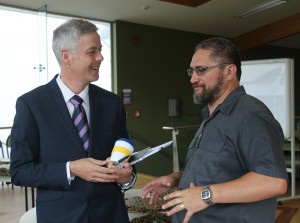
Professor Poia Rewi with DVC (Research and Enterprise) Professor Richard Blaikie at the launch of AKI.
Poia has always been a great innovator and collaborator. He helped develop AKI, an app to help learn Māori vocabulary with other Otago academics. He is also part of the team that came up with ZePA (Zero Passive Active), a model to advance the public’s attitudes and engagement with te reo Māori, and to promote Māori-language revitalisation, that is now used by a number of government agencies. Recently, Poia has worked with academics at Victoria and Auckland as a Co-Principal Investigator of Te Pae Tawhiti: Te Reo Māori, funded by Ngā Pae o te Māramatanga, looking at the value of te reo Māori in terms of the economy, cultural identity and social cohesion. This led to The Value of the Māori language: Te Hua o te Reo Māori, published by Huia in 2014, that won the Te Reo Māori category of Ngā Kupu Ora Aotearoa Māori Book Awards in 2015. Poia is currently Deputy Director of Ngā Pae o te Māramatanga, a position he will reluctantly have to leave behind for his new role in Wellington.
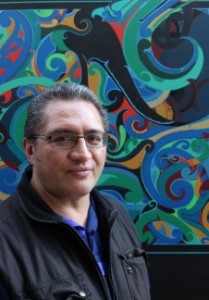 The revitalisation and advancement of te reo Māori have always been Poia’s passions. He was appointed to the board of Te Taura Whiri i te Reo Māori (Māori Language Commission) in 2012, and in 2014 was seconded from the university to be their acting Chief Executive. Poia’s new role, starting next month, is also in a similar field, as Tumu Whakarae (Chief Executive) of Te Mātāwai, a government agency created to assist hapū, iwi and communities in the important task of Māori-language revitalisation.
The revitalisation and advancement of te reo Māori have always been Poia’s passions. He was appointed to the board of Te Taura Whiri i te Reo Māori (Māori Language Commission) in 2012, and in 2014 was seconded from the university to be their acting Chief Executive. Poia’s new role, starting next month, is also in a similar field, as Tumu Whakarae (Chief Executive) of Te Mātāwai, a government agency created to assist hapū, iwi and communities in the important task of Māori-language revitalisation.
Our loss will be the community’s gain. Poia has been an amazing example for us in Te Tumu and the University of Otago, as a person who lives and breathes tikanga Māori, as an inspirational teacher, a leader in research, as well as a colleague and friend in the academy. We will surely miss him.

